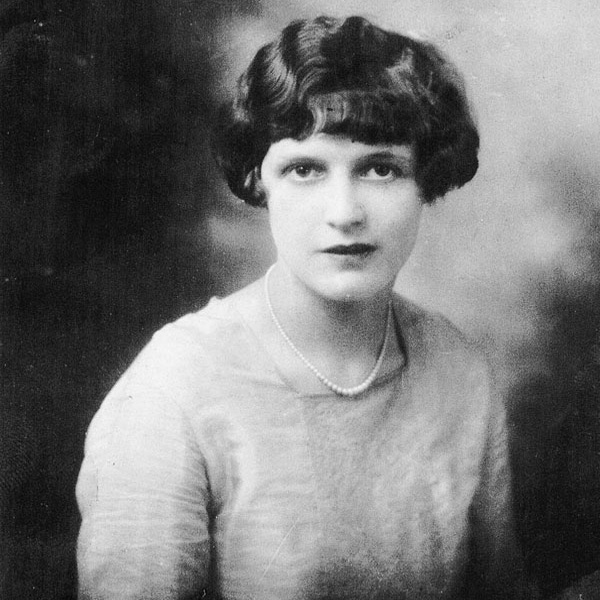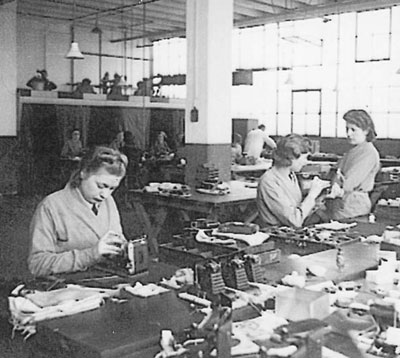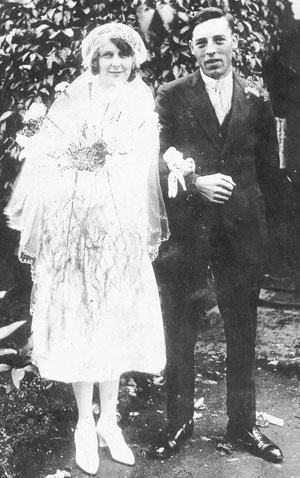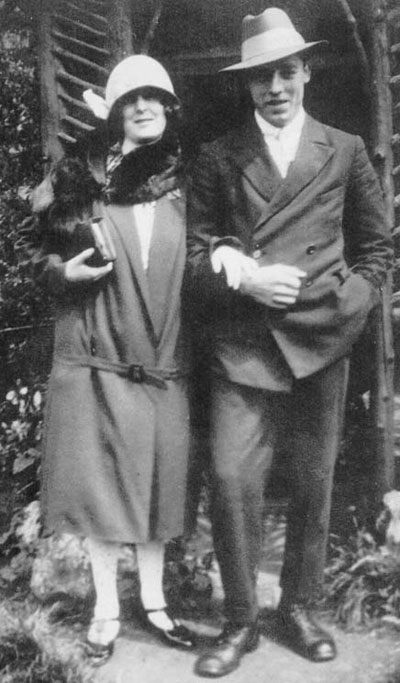Jellied Eels and Zeppelins (6 page)
Isn’t it funny when we look back and remember all those things? Flo did have lovely black hair before she lost it and it grew back all curly. And her brother Charlie was curly.’
The First World War ended at 11 o’clock on the morning of 11th November 1918, and there was great rejoicing, but also enormous sadness for all the bereaved:
‘My Mum picked us up out of bed and she said ‘Come on you two, you’d better get up, the siren’s going.’ Then she said ‘It’s all right, it’s the all clear!’ We had just come to the end of the war. It was a Saturday morning.
I remember the Peace Teas with all the trestle tables down the middle of the road. And we had a platform and people were singing and dancing and doing turns. Florrie and I were dressed as Japanese girls. We had paper chrysanthemums in our hair that Mum had made. I was sitting there, watching it all, and my Dad tapped me on the shoulder and said ‘I’m home!’ He’d been demobbed. I remember the first suit he had. He went up to the market and had it made with the ticket or whatever they gave him. And the first day he went out in it, it rained and the suit shrunk and the trousers came up to here. And he said ‘Look at this damn fine suit they give yer!’
After the War, Dad was offered a position in the prison service as a guard, but Mum didn’t want us girls to have to live near a prison - the job would have come with a house, you see. He was two inches too short anyway. I used to see him swinging from the door-frame to try and make himself taller. It didn’t make no difference.’
So Edwin Turner went back to work for Lipton’s
.

1923-1939
Seven
Hats, Coats and Cameras
Ethel left school at 14 to earn a full-time wage, though she and Florrie had worked part-time in a sweet shop:
‘Dad came in once and caught us scrubbing the floor. ‘You’re not doing that at your age - OUT!’ he said. The manager of the shop had once asked me to clean his shoes too, but I told him ‘I’m not here to clean your boots!’
I left school on the Friday and on Monday, Florrie and I had an interview at Houghton-Butcher manufacturing Co. Ltd. (
the company merged to become Houghtons and Butchers in 1926. In 1930, the firm came under the sales umbrella name of Ensign, a camera manufacturing company in Walthamstow
.) We started at dinnertime on the same day. Florrie had left school before me, as she was older, and had been working as a dressmaker, which is what my father wanted me to do. But she was no good at it, so she left and we both got work at Ensign.
When my sister started work two years before me, Dad bought her a coat - ‘Cos he said that she should have one to go to work in. When I left school to start work, I wanted a coat. Dad agreed to buy me one. We went up to our local drapery shop, Lidstone’s - they had two big shops - and Mum and Dad bought me a coat. It was chocolate brown with fur around the collar and cuffs.

Colleagues at work at Ensign Cameras
On the second Friday I got paid. Mum took my wage packet, put it on the table and said ‘You’ll open that when your father gets in’. Dad came home from work and saw that I’d got eight shillings. He give my mother seven for my keep and he said ‘Here’s a shilling for you.’ I thought that was really good, but then he said ‘Ah - wait a minute!’ He split the shilling into two sixpences. Now this is what my father done. He give me sixpence and said ‘This sixpence, you can have to spend. The other one, you can pay to me every week until you’ve paid me 25 shillings and a shilling extra for borrowing the money for your coat!’ Yet he gave my sister hers. My mother never forgave my father for that. You know what he said when I’d paid it up? ‘That’ll teach you not to borrow money!’ It was a good lesson, ‘cos I never ‘ave done - only the three pounds I borrowed from him for our bed when I got married. He said then ‘You can borrow it on condition that you pay it back with your first week’s wages when you go back to work.’ And I did.
Florrie worked as an ‘engraver’, stencilling the company’s name onto the cameras. She was at Ensign until her marriage in 1927. I later became a ‘tester’ or inspector, a chargehand, supervising about a dozen female workers, and worked there for 18 years.
When I was laid off for a few months, when they was a bit slack, I worked in this toy place. I got it on me own. Down the market it was. Well, what happened, I’d been there a fortnight. I was on the big power press (they’d found out that I’d used a hand press at Houghton-Butchers, so they put me on the power press. Great big heavy thing, it was).
I started at eight in the morning and worked ‘til 12, then I used to rush down the market and have some dinner and come back at half past one and carry on ‘til half past five. I was working on these big sheets of metal - bodies for these toy cars - and, I went round to get some more metal and to go to the toilet (you had to ask the forelady for the key to the toilet door and you were only allowed to go twice in the morning. You got told off if you went more than twice). I came back and they’d oiled my machine and mucked about with it, so the pedal was rather low on the floor. I put my foot on the pedal and slipped, so I put out me hand to save meself and squashed me finger on the press. They stopped the press then and sent me home on me own. I was really in pain and remember walking down the market and around Woolworths and they was watching me in case I passed out.
I got down Coppermill Lane and, when I reached home, Mum said ‘What you doin’ home?’ I told her that I’d hurt meself. Florrie was still in bed, so Mum said ‘Come on Florrie, we’ve got to get Ethel to hospital.’ My sister got up, took one look at me and passed out! So I said ‘She’s not much good to me, I’ll go to hospital on me own.’ I went to Connaught Hospital and they gave me five stitches in my finger. After that, I wouldn’t go back to the toy company, so I returned to Houghton-Butcher and they said that I could start in the inspections department. I really loved that job and enjoyed going to work.
Dad used to wear a flat cap for work and a trilby for going out. Mum used to like to wear hats too. When I was a kid, I would say to my Mum ‘You’ve always got second-hand things. You’ve never got no new clothes. When I grow up, I’ll get you something new. When I started work, I had that on my mind. It took me quite a long while to save £5, ‘cos I was only gettin’ eight shillings a week ‘til I was 21 and seven of that I had to give to Mum.
Well, I saved up and had a coat made for my mother in Scotch herringbone tweed by the brother-in-law of one of my friends at work, who was a ladies’ tailor. If you could ‘ave seen my Mum’s face. It was the first new thing she’d had. I was then 17 or 18. I’d saved all that time for it.
One Saturday, soon after I’d given it to her, Mum wanted to go shopping. ‘I want you to come with me,’ she said. She puts this coat on and gets up to the Blackhorse Road, to the market, and she said ‘This is what my Ethel bought me. Brand new it is!’
Do you know? She went to a stall and she picked out a fawn-coloured hat with a bunch of cherries on it. Cost her ‘alf a crown. When she died in the bungalow next door to here, the coat was still in the cupboard - she had worn it and worn it and, each time she put it on, she’d say in a posh voice ‘My daughter had this made for me.’ She was so proud.
I thought the world of my mother and would give her anything. I looked after her until she died in 1955. I had a job that somebody else wouldn’t have liked: washing your mother after she’d died of dropsy. Just two days before she died, I was washing her, when she said ‘There’s no one in this world, who’s got such a wonderful daughter as I have.’ I replied ‘And I’ve got the most wonderful mother in the world.’ I still always put flowers around her photograph in my front room. She died the year after my sister died from cancer. I think it was the shock of that which killed her in the end.’
Lucky Dreams and Boyfriends
‘I used to love dancing and, when I was 14, would go down to the church hall - us three girls used to go, Cousin Flo, Florrie and me, with the kids over the road - to the Threepenny Hop. The boy opposite, Roy, I think, used to play the trumpet or something there. We used to go and encourage him.
I had an accordion you know. My Dad bought my sister one and my Mum had a row with him about it, ‘cos he hadn’t bought me one, so he went and got me one. He paid about £3 for it. I was about 16 or 17, I suppose. There was a special book inside that you could teach yourself from. I taught meself, ‘cos I had played the piano. I played the accordion a lot until the Second World War, when I put it away. You couldn’t play during the war, ‘cos you were always in the dugout or at work. When I sold it in the 1990’s, the keys were as white as when I first had it. I hadn’t played it for years - one of the reasons, was that our dog, Bill, didn’t like it and used to howl.
I had piano lessons when I was a kid - my Mum paid sixpence a fortnight. Miss Peachley was my teacher. She used to rap my knuckles with a stick if I played the wrong note, wallop! I’ve still got a lot of the music that I used to play. I was eight years of age when I started. I had a few lessons and didn’t like it at first, so I gave up, but went back again later. She was a lovely teacher. I was getting on ever so well - I’d been learning for four years - when I smashed my finger at the toy maker’s and couldn’t play any more. My sister could play by ear, but I couldn’t. We had an old piano that had been given to us, but, with my bad finger, I couldn’t practise.
When I was very young, we never had any radio or television. The first radio we ever had was a crystal set when I was about 12 or 13. My future brother-in-law made it. You used to have to fumble around with a cat’s whisker (
a fine adjustable wire in a crystal radio receiver
) to get any sound at all. You had to push the little lever in and move it about until you found a good spot on the crystal. Florrie and I used to go over to Clapton, where Alf lived then, while he was making them. We would sit up in his room and he would give me one earphone and my sister another one and say ‘Don’t bend the cat’s whisker!’ If you bent it, you lost all your sound.
(We had no idea that Florrie and Alf were courting for about three years. She didn’t tell us, ‘cos her chap was her second cousin. Mum didn’t agree with it, but Dad did. They married when Florrie was 19. They had two black Daimlers for their wedding - £1.50 it cost them.)
The first proper radio set we had, had a speaker made by wooden leaves pushed into metal ribs. Stuck together, it made a horn. They used to run off the wood in pieces down at the woodyard next to Ensign. You could buy a little tiny set and fit it with the speaker, but it had to be properly done.

1927: Florrie and Alf’s wedding
When I first worked at Houghton-Butchers, they used to put me on a bench, where I used to have to stick the wooden leaves into the metal rib of the horn. I used to have to glue all the leaves in. They were similar to the horns on the old-fashioned gramophones, only smaller. I was only doing that for a little while until they got rid of that trade, then I went downstairs onto the presses.
